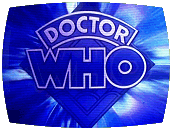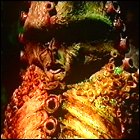 Recalled to Earth by the Brigadier via time-space telegraph, the TARDIS brings the Doctor, Sarah and Harry to the Scottish moors, not far from where offshore oil drilling platforms have been subjected to a series of attacks from the sea – but UNIT can find no traces of attacks from either a boat or a submarine. In the nearest village, the Doctor uncovers evidence that someone there may be behind the attacks, and Harry is shot while trying to help a man washed ashore from the latest attack.
Recalled to Earth by the Brigadier via time-space telegraph, the TARDIS brings the Doctor, Sarah and Harry to the Scottish moors, not far from where offshore oil drilling platforms have been subjected to a series of attacks from the sea – but UNIT can find no traces of attacks from either a boat or a submarine. In the nearest village, the Doctor uncovers evidence that someone there may be behind the attacks, and Harry is shot while trying to help a man washed ashore from the latest attack.
Season 13 Regular Cast: Tom Baker (The Doctor), Elisabeth Sladen (Sarah Jane Smith)
written by Robert Banks Stewart
directed by Douglas Camfield
music by Geoffrey BurgonGuest Cast: Nicholas Courtney (Brigadier Lethbridge-Stewart), Ian Marter (Harry Sullivan), John Levene (RSM Benton), John Woodnutt (Duke of Forgill / Broton), Hugh Martin (Munro), Tony Sibbald (Huckle), Angus Lennie (Angus McRanald), Robert Russell (The Caber), Bruce Wightman (Radio Operator), Lillias Walker (Sister Lamont), Bernard G. High (Corporal)
Broadcast from August 30 through September 20, 1975
LogBook entry & review by Earl Green
Review: Sometimes, Tom Baker-era Doctor Who was at its best when dropping a fairly traditional story into the middle of a previously unexplored setting (see also The Talons Of Weng-Chiang and The Horror Of Fang Rock), and Zygons is a fine example of that genre – effective and very creepy. The  Zygons, one of the thankfully few shapeshifting alien species to appear in Doctor Who, were among the show’s most effective adversaries and it’s a wonder they didn’t come back during the show’s lifetime. (Now, of course, they have their own audio series.)
Zygons, one of the thankfully few shapeshifting alien species to appear in Doctor Who, were among the show’s most effective adversaries and it’s a wonder they didn’t come back during the show’s lifetime. (Now, of course, they have their own audio series.)
Zygons also bids farewell to Harry Sullivan as a regular companion; he makes a further one-off appearance in The Android Invasion, but as of Zygons he remains on present-day Earth and resumes his duties with UNIT. Really a bit of a pity, as Ian Marter was outstanding in the role, and together with Elisabeth Sladen was responsible for one of the best TARDIS companion “teams” in the series’ history; he later died of complications from diabetes in 1986 after transforming his acting career into a writing career that included numerous well-received Doctor Who novelizations.

